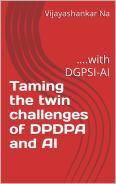There was an article in DNA today titled “Flipkart’s Big Billion Day paves way for e-comm regulation” drawing attention to the possibility of a new E Commerce Regulation.
Naavi.org strongly opposes this attempt to tie down E Commerce in a new regulatory framework. Presently E- Retailing is under the same regulation as Brick and Mortar Retailing (BMR) except for the fact that communications between the consumer and the retailer occurs in electronic documents which are regulated by the provisions of ITA 2008. (Information Technology Act 2000 as amended in 2008).
While the BMRs have been miffed by the grand sale achieved by Flipkart on October 6th, they have no right to speak on behalf of the E Consumer. The apology of the Flipkart promoters was to the E Consumers and if there are any issues regarding customer service it is some thing that the consumers need to sort it out with Flipkart.
All India Dealer’s Association has no role to poke its nose in the matter. At best it is the Consumer Rights organizations (Only those who understand E-Consumer Rights) can stand up and make a comment.
It is my personal observation that Flipkart has been handling consumer complaints fairly efficiently by following an easy return policy in case of disputes. In terms of delivery they are super efficient. Hence their consumers donot have much of complaints.
On the Big Billion day there could have been problems arising out of early sell out of super discounted offers because there could have been such a demand. We often see such sell outs in the case of high demand limited supply products such as airline tickets, cinema tickets, cricket match tickets etc. Consumers will take these disappointments in their stride.
If there have been booking of such orders, money received and subsequently cancelled for wrong reasons, they can be checked through an E-Audit of transactions.
Recently I had such an experience in Amazon.in and I did voice my displeasure since they had collected payment. However they refunded within the next 48 hours and hence the response was not wholly unreasonable. As consumer I would have been happy if they had added a small discount coupon for my next purchase to reduce my disappointment but Amazon.in did not have such vision. I am not aware if Flipkart had similar instances and if so, whether they tried to provide any such incentives to keep the dissatisfied customers happy. As a Netizen Consumerist, I would fight for such benefits rather than complaining that Flipkart gave huge discounts.
Brick and Mortar retailers should also recognize that special day sales are not uncommon in the physical society in the form of Exhibition sales, Clarence Sales or Diwali, Dussera, New Year sales etc. Consumers throng the shops on those days some times creating stampedes requiring Police to intervene and maintain law and order.
Has the Government intervened in such cases and questioned the discounts offered? If not why should Government be worried about the Flipkart sale?
Brick and Mortar retailers have to also remember that their markets are distinctly different though some overlap cannot be ruled out. If Competition act has to be invoked, the interested stake holders are other online retailers such as Snapdeal or Amazon and not the members of the All India Dealer’s association.
If the All India Dealer’s Association uses its political contacts with BJP try to interfere in E Commerce legislation, it will be a tragedy and a big blow to Narendra Modi’s vision of Digital India.
The All India Dealer’s Association as well as the Brick and Mortar Retailers should realize that they have certain strengths of their own which actually make them more powerful than the E-Retailers. In fact it will be a travesty of truth if we consider that “Flipkart” enjoyed a “Dominant” status and hence comes under the ambit of unfair trade practices.
If the Brick and Mortar traders so desire, they can always have an E-Tailing division so that they can enjoy both the online and offline trading opportunities. If they fail to do so, it only indicates that they lack the necessary business acumen and they cannot expect regulation to support their inefficiency.
Observers of Internet are aware that when Amazon developed itself an online book seller, it did put other leading offline book stores into reverse gear. It took some time for Barnes and Noble and others to accept the changes and devise their own strategies to survive and grow.
We are seeing similar developments in the Retail sector in India and this should not be curbed by any special legislation.
Present legislation on unfair trade practices as well as frauds when read along with ITA 2008 are adequate to deal with any E-Retail regulation issue.
Naavi
Also Read: Flipkart Success invites jealous backlash






